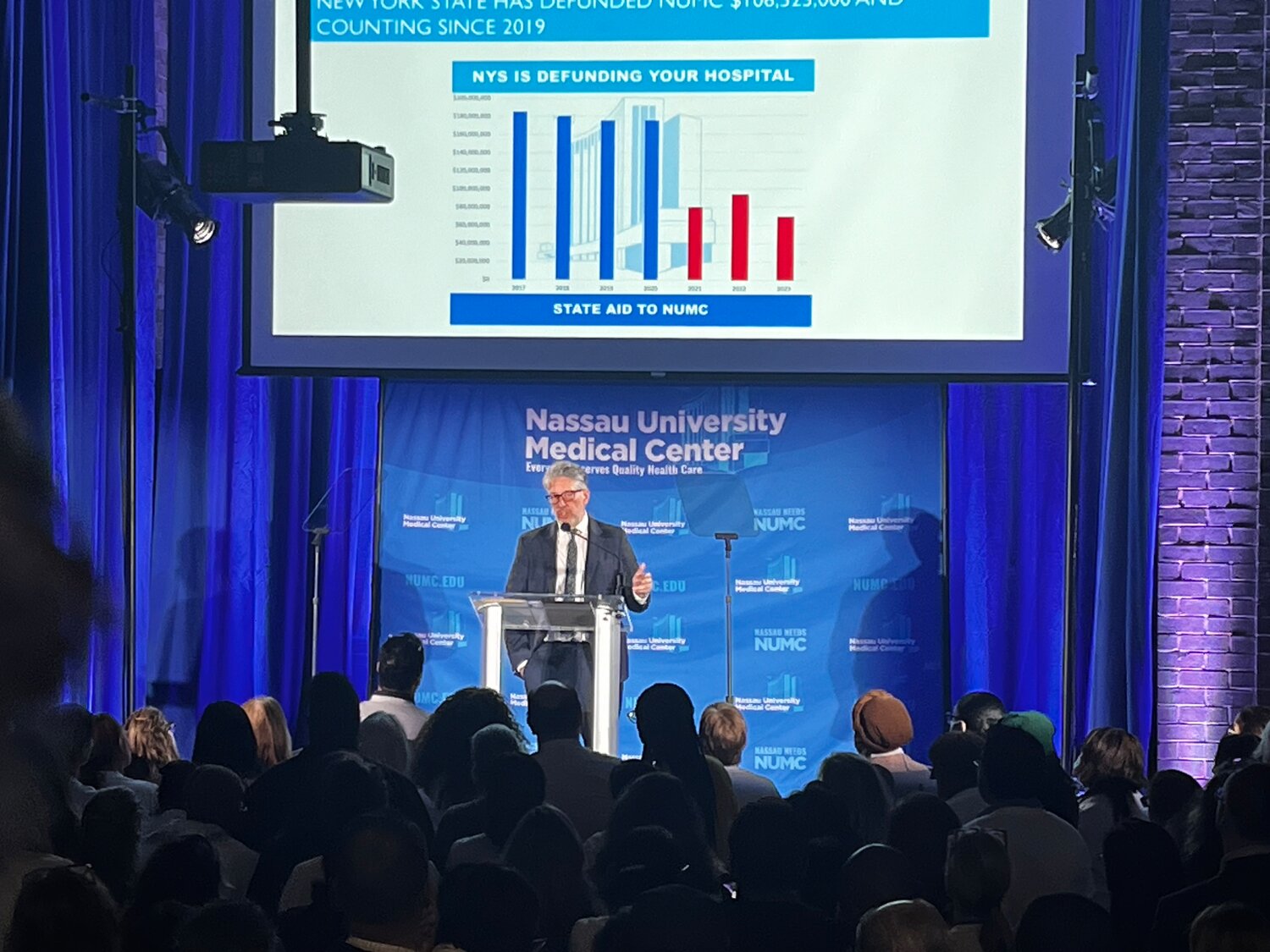Nassau University Medical Center remains on life support
300 jobs could be gone and the hospital could close by July, says chairman
Nassau University Medical Center, a public benefit hospital serving over 270,000 patients annually and Long Island’s only Level One trauma and burn center, is on the brink of a financial collapse and could cease to operate by July, according to hospital Chairman Matthew Bruderman.
This week, County Legislator Siela Bynoe and other Democratic officials called for Bruderman’s resignation after the state health commissioner, James McDonald, informed the hospital and the County Legislature that in order for them to receive $83 million in emergency funds, NUMC would have to agree to the state’s terms: to conduct a nationwide search for a new chief executive, submit a detailed five-year plan for improving operations and reducing losses, submit monthly progress reports, review its organizational structure and implement a quality-improvement plan.
But according to Bruderman, who led a recent two-hour “employee town hall,” the hospital has already done these things, and he is refusing to comply further, calling the state’s demands and the legislators’ calls for his resignation “extortion,” and characterizing claims that the hospital is being mismanaged as false.
“The state decided that in our state, we want to make sure that everyone can access health care,” Bruderman said. “That’s what we pledged to do through legislation — it doesn’t matter your color, creed, religion, or how much money you have. The three safety-net hospitals were set up to serve the people with a special mission.
“Now, the state needs to make good on its promise and pay its bill,” he said. “Eighty-three million dollars, you know what that is? That's extortion and blackmail, for the sake of poor people’s health care. No, I’m not going to comply with the state’s demands, and I’m not going anywhere.”
But the 3,200 health care workers at NUMC aren’t worried about whether Bruderman will remain, but instead whether they will still have jobs in the coming months. Ron Gurrieri, president of CSEA Local 830, the union that represents the hospital’s employees, told reporters that workers are worried about their jobs, and how the hospital would continue to stay open and operate if it doesn’t receive the funding.
According to a report released last month by consultants for the Nassau Interim Finance Authority, a state board that controls both NuHealth and county finances, NUMC may run out of money by late April.
Bruderman insisted that the state is at fault for the fiscal condition of the hospital, saying he inherited a complete mess when he was appointed almost two years ago. He also blamed a massive drop in state funding as the main contributor to the hospital’s financial woes. Since 2017, state funding for NUMC has plummeted by more than $160, million from $189 million to just $30 million this year, according to County Executive Bruce Blakeman’s office. That is just about all the money NUMC has left to operate — which Bruderman told reporters he believes is enough to last through July, but not without possibly having to cut nearly 300 jobs very soon.
He also claimed that state officials, whom he did not name, have told him that their plan is to shut down the hospital and force patients into the for-profit health care system — claims that Gov. Kathy Hochul’s office and county legislators deny, with Bynoe describing Bruderman’s “town hall” as a “bewildering tirade” that eventually “devolved into a disconcerting spectacle of blame-shifting and the promotion of unsubstantiated conspiracy theories for over two hours,” she added, “with no clear direction.”
In a statement released Tuesday, Hochul’s office called Bruderman’s claims “as baseless as they are misguided,” and added that the governor “remains fully committed to health care accessibility for all,” but “the state cannot give a bailout using taxpayers’ dollars without ensuring structural reforms.”
But no matter who is at fault, a hospital in which 70 percent of patients are members of racial minorities and more than 80 percent are on Medicaid or Medicare, a permanent closure would be a burden that the county’s most vulnerable would bear — with taxpayers also remaining on the hook for over $100 million in debt.
“This is very bad for the community,” said Barbara Powell, president of the Hempstead NAACP. “Catastrophic, even.” Powell said she believed that because of the demographics of the patients that NUMC’s closure would affect, Bruderman and the state believe they can play politics at the expense of the community’s health care lifeline — especially for Uniondale, which does not even have an urgent-care facility within its borders.
Assemblywoman Taylor Darling said she believed that if NUMC — which also serves the county’s incarcerated population — is to be saved and kept afloat, leaders of the hospital, the county and the state need to stop pointing fingers and come together “to think beyond political semantics and look at real solutions” before it is too late.

 44.0°,
Mostly Cloudy
44.0°,
Mostly Cloudy 




